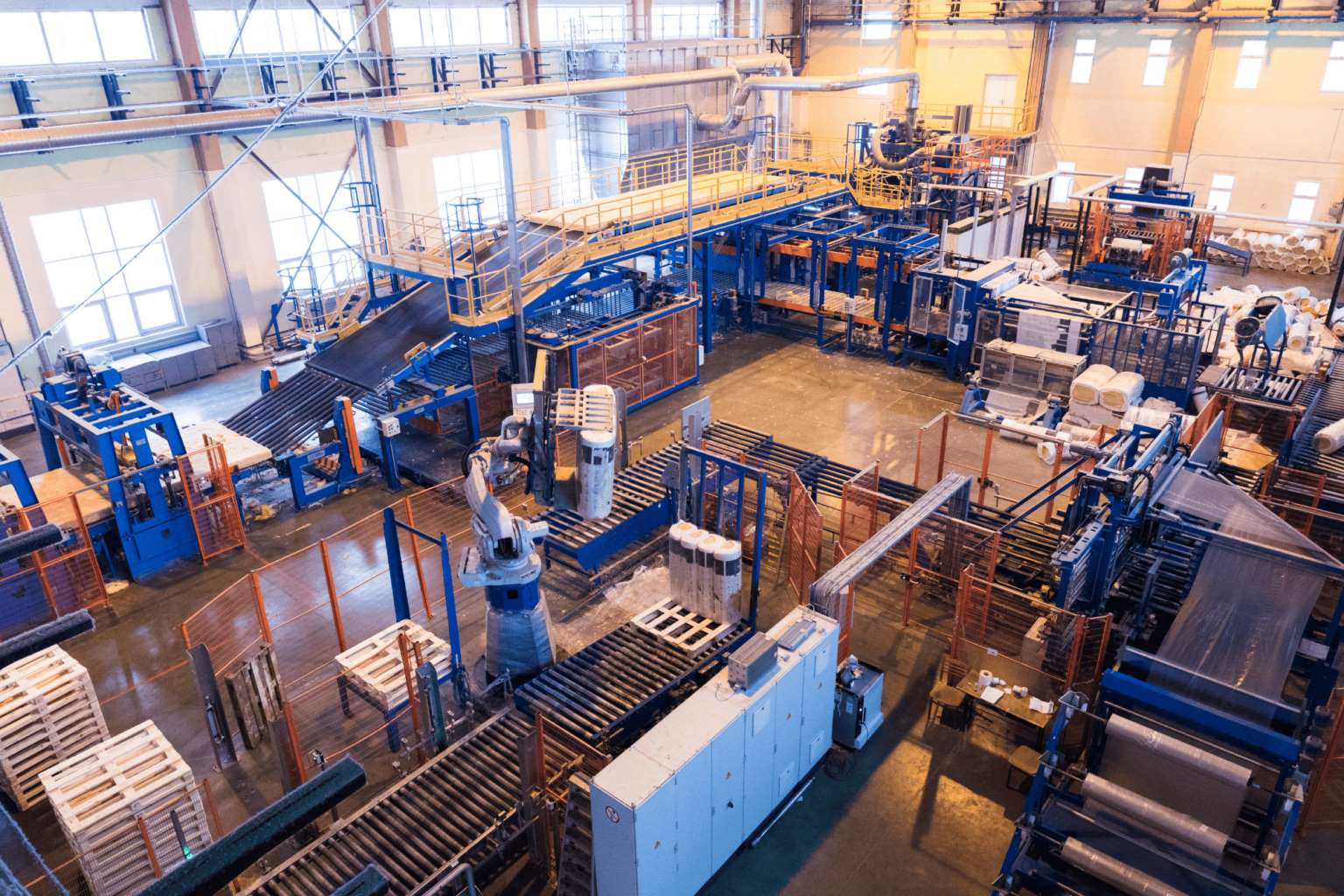SINCE 1988
203-546-7793

For businesses in Newtown, CT, prioritizing efficiency and scalability, an industrial property for sale offers the perfect solution to meet operational demands, with spaces often exceeding 100,000 square feet to accommodate diverse needs. Additionally, their robust structures, zoning flexibility, and proximity to transportation hubs make them essential for operations across various industries.
Here are six types of businesses that thrive in an industrial property for sale.
How to Choose the Right Industrial Property for Sale
Frequently Asked Questions (FAQs)
Find the Right Industrial Property for Sale with Tower Realty Corp!
Key Takeaways✔ Industrial property for sale provides spacious layouts and robust infrastructure, making them ideal for housing machinery and streamlining production processes. ✔ Industrial properties ensure efficient storage, sorting, and transportation of goods, making them perfect for logistics and distribution companies. ✔ Adaptable spaces and proximity to urban markets make industrial properties perfect for e-commerce fulfillment. ✔ Specialized equipment needs for food and beverage companies are supported by industrial properties with temperature-controlled areas and sanitation systems. ✔ High power capacity, climate control, and security make industrial properties suitable for data storage and tech-driven operations. ✔ Affordable and customizable, these properties cater to crafting, material storage, and heavy machinery use for artisan businesses. ✔ Evaluating location, zoning, infrastructure, and scalability ensures businesses select a property aligned with both current and future needs. |

Manufacturing companies rely on large, well-equipped spaces to house their machinery, store materials, and streamline production processes. Industrial properties are tailored to meet these demands, as they offer zoning flexibility and accessibility to transportation hubs. Businesses in manufacturing benefit significantly from an industrial property for sale as it aligns with their operational needs and growth potential.
Logistics and distribution centers depend on strategically located, spacious properties to store, sort, and transport goods efficiently. An industrial property for sale provides the infrastructure required for these operations, including loading docks, parking areas, and easy access to transportation hubs.

E-commerce businesses require industrial spaces to manage high inventory volumes, automate processes, and ensure fast shipping times. Industrial properties meet these needs with flexible layouts and advanced infrastructure. An industrial property for sale is an ideal choice for e-commerce businesses striving for operational efficiency and scalability.
Food and beverage businesses need industrial spaces to handle production, packaging, and storage while adhering to strict health regulations. Industrial properties cater to these requirements with features like temperature-controlled areas and zoning for food manufacturing. An industrial property for sale offers a cost-effective solution for food and beverage companies looking to expand or streamline operations.
Tech companies and data centers require industrial spaces equipped with high-power capacity, robust security, and climate control systems. An industrial property for sale meets these needs by offering scalable layouts and specialized infrastructure.
Specialty workshops and artisan businesses require industrial spaces for crafting, operating heavy machinery, and storing materials. An industrial property for sale provides affordable and adaptable environments for these unique needs.
Selecting the ideal industrial property for sale in Newtown, CT, is crucial, especially as U.S. demand surged to 43 million square feet in Q2 2024 — a 53% increase from the previous quarter. From location to infrastructure, each element maximizes operational efficiency and long-term growth.
The following six considerations can help businesses make an informed decision when exploring an industrial property for sale:
The location of the industrial property for sale is critical for businesses that rely on transportation and logistics. Proximity to highways, ports, or railways ensures efficient movement of goods and reduced transportation costs. Additionally, being near suppliers or distribution hubs can enhance supply chain operations. Businesses should also consider the local workforce availability to support daily operations.
Industrial zoning regulations dictate the types of activities allowed on the property. Ensuring that the zoning supports specific business operations, such as manufacturing or storage, is essential. Understanding restrictions, such as noise levels or waste disposal requirements, can also prevent operational issues. Businesses should confirm that the property meets both local and industry-specific compliance standards.
The infrastructure of an industrial property for sale can significantly impact its functionality. Features like high ceilings, loading docks, and heavy-duty floors are essential for manufacturing and storage needs. Additionally, assessing utilities such as power capacity, water supply, and climate control options ensures the property can handle operational demands. Modernized infrastructure can also reduce the need for costly upgrades.
As businesses grow, they may require additional space or facilities. Choosing an industrial property for sale with expansion options, such as adjoining lots or adaptable layouts, is a smart investment. Scalability ensures that a business can adapt to future needs without the expense of relocating. Businesses should also assess the property’s structural flexibility for internal changes.
Security is a key concern, particularly for businesses handling valuable goods or sensitive data. Features like gated access, surveillance systems, and fire safety measures are crucial for ensuring the safety of the property and its contents. Evaluating the surrounding area for crime rates and other risks can further enhance decision-making.
The total cost of ownership extends beyond the property’s sale price. Maintenance expenses, utility costs, and potential upgrades must be factored into the decision. Businesses should also consider tax implications, insurance premiums, and any local fees associated with industrial properties. A thorough financial analysis ensures that the property remains a cost-effective choice in the long run.
There are several financing options for industrial properties, including traditional bank loans, Small Business Administration (SBA) loans, and private financing. Each option comes with different interest rates, terms, and down payment requirements, so it is essential to compare them based on the business’s financial situation. SBA loans, for example, often provide favorable terms for small businesses, especially for owner-occupied properties. Consulting with a financial advisor or lender can help businesses determine the best financing route.
Whether an industrial property can be used for mixed purposes depends on its zoning regulations. Some industrial properties allow mixed-use operations, such as combining office space with manufacturing or warehousing. However, businesses should confirm with local zoning authorities before making plans. Proper zoning ensures compliance with legal requirements and avoids penalties or operational disruptions.
Environmental factors, such as soil quality, potential contamination, and local environmental regulations, should be thoroughly evaluated. Conducting an environmental site assessment (ESA) can identify potential hazards or liabilities, such as previous chemical spills or improper waste disposal. Addressing these issues before purchase can prevent costly cleanups or regulatory fines.
The ideal property size depends on current operations and anticipated growth. Businesses should consider space requirements for production, storage, and future expansion while avoiding unnecessary square footage that could increase costs. Consulting with a space planner or an expert in an industrial property for sale can help estimate space needs accurately.
Owning industrial property can provide tax benefits, such as depreciation deductions and expense write-offs for maintenance and improvements. Additionally, businesses may qualify for local tax incentives or credits, particularly in designated economic development zones. These benefits can reduce overall operational costs and improve cash flow. Consulting with a tax professional ensures businesses take full advantage of available deductions and credits.
Tower Realty Corp in Newtown, CT, specializes in connecting businesses with the perfect industrial property for sale to meet their unique operational needs. With extensive knowledge of the local market and a commitment to personalized service, Tower Realty Corp helps clients navigate every step of the process, from property selection to closing. Whether your business requires a space for manufacturing, warehousing, or logistics, our team ensures you find a property that aligns with your goals.
Partner with us today and secure an industrial property that positions your business for long-term success!